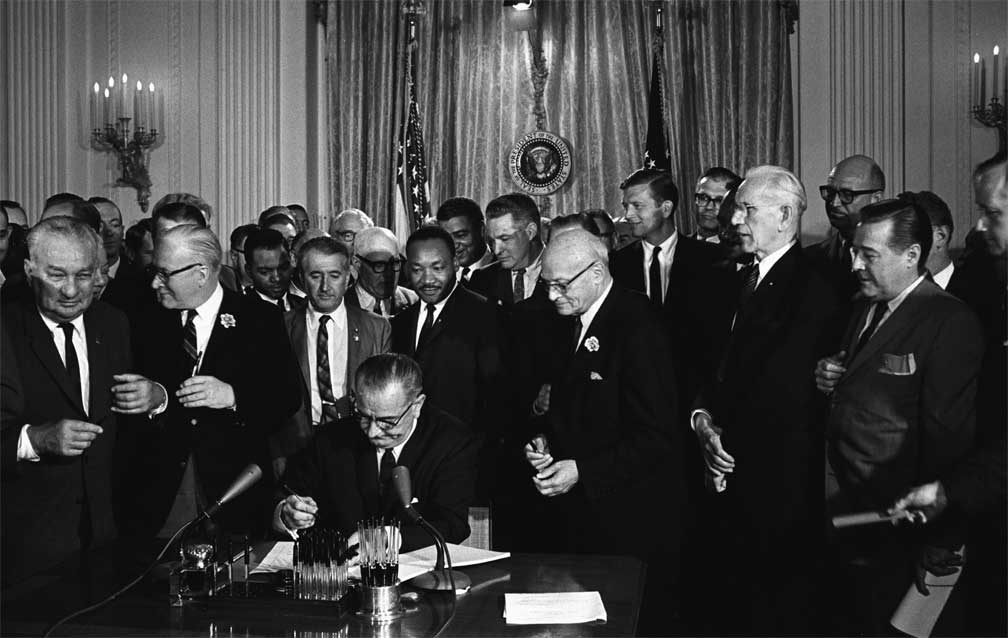Civil Rights Act of 1964

Signing Civil Rights Act
After a long fight, the Civil Rights legislation of 1964 was passed. It gave the federal government broad powers to fight discrimination of all kinds.
President Kennedy had equivocated on Civil Rights legislation until the violent confrontation in Birmingham in May of 1963 spurred him to action. On June 19, 1963, President Kennedy submitted the Civil Rights Bill to Congress. The law, which had many features, is best known for its Public Accommodations section.
After the assassination of President Kennedy, President Johnson committed himself to pass the Civil Rights Law. As Johnson wrote: "I believed that a huge injustice had been perpetuated for hundreds of years on every black man, woman, and child in the United States." Johnson stated in his address to Congress on November :
"No memorial oration or eulogy could more eloquently honor President Kennedy’s memory that the earliest possible passage of the Civil Rights Bill for which he fought so long. We have talked long enough in this country about equal rights. We have talked for one hundred years or more. It is time now to write the next chapter, and to write it in the books of law."
The fight for passage was long and arduous. First, the bill had to be pried out of the Rules Committee, which was chaired by Howard Smith, a segregationist Congressmen from Virginia. After the legislation advanced beyond Smith's committee, the bill was debated on the House floor. In the course of the debate, Smith proposed an amendment. He suggested that Title VII of the legislation; which made it unlawful to discriminate in employment based on race, color, religion, or national origin; include gender as one of the criteria. Smith's proposal had been designed to make the bill so unpalpable that it would be eventually defeated. Nevertheless, voting against the bill, even with the amendment, would have caused too many political problems for most Congressmen. Thus, on February 10th, the amended bill was passed in the House as HR 7152.
Now it was up to the Senate. The major obstacle was a potential filibuster, the use of extended speeches and debate to prevent a piece of legislation from being passed. Under Senate rules, it required a 2/3 vote to cut off debate on any matter. On March 9th, Southerner Senators, led by Richard Russell, began their filibuster. The filibuster lasted for two months. During that time, the pressure was constantly being applied both outside and in Congress to achieve the magical 67 votes needed to achieve closure. Outside the Congress, Catholic, Protestant, and Jewish clergy kept a constant prayer vigil. President Johnson and other supporters of the bill put pressure on Senator Dirkson, the Republican leader, to bring the debate to a close. After much wrangling and some amendments to the bill, Dirkson agreed to support closure. At 10:00 AM on June 10th, the Senate was called to order. Senator Dirkson gave a short speech, in which he stated:
"It is said that on the night he died, Victor Hugo wrote in his diary substantially this sentiment: 'Stronger than all the armies is an idea whose time has come.' The time for equality of opportunity in sharing in government, in education, and employment. It must not be stayed or denied.” Thus, closure was achieved, although it took nearly another month for the bill to actually pass the Senate and return to the House for its approval. Finally, on July 2nd, the Civil Rights Act was passed.
 >
>